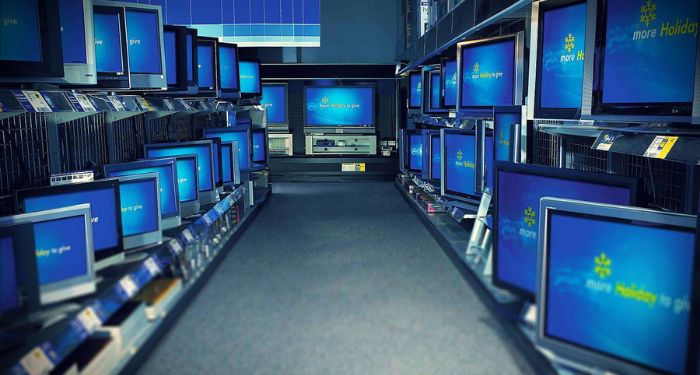What Are TVs On Finance?
Many retailers offer customers the option of buying items with staggered payments; a payment option often referred to as paying on finance or sometimes as buying on credit. In most cases, this means you can immediately own and take home your chosen item, such as a TV set, computer or audio equipment, without having to pay the full cost upfront.
The growth in Smart TV sales has seen buying a TV on finance become an increasingly popular option. This is because spreading the cost of what can be an expensive purchase over a period of time allows customers to choose from a broader range of TVs. This includes sets that may be otherwise unaffordable as a one-off full cost payment.
It is common for retailers to offer finance deals for some TV brands and ranges, but not all. Whether a brand or particular model of TV is available on finance or not, will depend on the individual retailer. So, if you are looking to buy a specific brand or model on finance, it is worth searching online by brand name to find which retailers offer the best deals.
Buying any item on finance is in effect a credit agreement, which means that the customer has entered a legally binding contract to pay for the item purchased according to the terms and conditions set. This includes penalties for defaulting, that is failing to pay the amounts agreed, the right of the creditor to pursue payment from the customer and also to prosecute the customer for failure to pay.
A person under the age of 18 cannot legally enter into a credit agreement under UK law, which means it is improbable that anyone under the age of 18 will be able to buy a TV on finance. Companies conduct extensive checks on credit requests to ensure that they do not enter into credit agreements with underage customers.
Anyone who is over 18 years of age is free to apply for finance on a TV purchase. There is never any guarantee that a customer's request will be accepted. Still, all requests are treated on an individual basis, so being denied finance by one retailer, may not necessarily mean that you will not be able to find a deal elsewhere. There are also specialist retailers, such as catalogues and mail order, which offer finance purchases as standard.
It is always worth applying, and also worth remembering to check if the decision on your application will have any effect on your credit score before deciding whether or not you wish to apply for finance. In the vast majority of cases, having a finance request denied will not have any effect on your credit rating.
- What Are TVs On Finance?
- How Do TVs On Finance Work?
- What Information Will I Need to Provide and Will I Need a Credit Check?
- Can I Purchase a TV on Finance with Bad Credit?
- Benefits of TVs on Finance
- Disadvantages of TVs on Finance
- Who Offers TVs on Finance?
- Considerations Before Purchasing a TV on Finance
- Conclusion
- FAQs
- Sources
How Do TVs On Finance Work?
When a customer buys an item on finance, they have entered into a legal agreement with creditors, so it is very worth knowing how this agreement works, what to expect and the legal rights and obligations involved.
When a television is bought on finance, it means that a lender, such as a bank or specialist retail finance provider, has agreed to loan the customer the price of the item.
In contrast, the customer, in turn, agrees to repay the loan according to the terms and conditions of the agreement. The loan is not usually given by the retailer itself. It is therefore not the retailer who decides whether any customer's application to purchase an item on finance is accepted or not.
Repayments will be calculated typically divide the cost of the item into equal amounts to pay each month, over an agreed period usually no less than three months and not more than two years.
Finance deals tend to be extremely flexible, however, and you can generally negotiate the length of the repayment period. The longer the period, the smaller the instalments will typically be, however interest is far more likely to be attached to longer periods and the longer a customer takes to pay off for a purchase, the more interest they will end up paying on the item.

Finance deals will typically come as one of three options:
1. Interest-Free Credit
An Interest-Free credit agreement means that you can purchase your television set, and pay the exact retail price with payment instalments over an agreed period of time. This is the most preferred finance option among customers as it offers the benefit of not having to pay out a large sum at once while avoiding any increase in price due to interest payments on the loan.
It is essential to ensure that the terms of any interest-free deal have been made cleat before committing, some deals will be interest-free only for a set period, after which interest will be charged on payments. So be sure to double-check the conditions before entering into any agreement.
2. Interest-Bearing Loan
Finance in the form of an interest-bearing loan means you will be loaned the price of the item but will have to repay a little more than the initial loan. How much more a customer will repay will depend on the individual agreement, and this is where customers of Interest-Bearing credit deals are urged to exercise most caution.
The amount you will be asked to repay over and above the cost of the item will always be stated in the offer as an APR (Annual Percentage Payment). Customers should always check and ensure that they fully understand the APR will mean in terms of repayment on any loan.
If the agreement does not show precisely how much the interest percentage will add to the cost of the TV, a customer should request a breakdown of the offer in which that cost is clearly stated.
Most retailers will offer standard APR on financed purchases, which means that all customers will pay the same amount of interest on an item. However, some of the specialist retailers will make offers based on individual credit ratings, which means the final cost of any item can vary substantially between customers.
3. Buy Now and Pay Later Deals
An increasing number of high-street and online retailers are offering buy now pay later (BNPL) arrangements, which means that a customer pays nothing for their purchase for an agreed period of time. After that period, the retailer will usually take payment from an agreed account, most often in agreed instalments, or if a customer has chosen, in a full lump sum.
The retailer will always request and hold your card details to make the offer and take payments at the agreed time. Many, though not all, of these offers are interest-free, and customers should always carefully read through the terms of any finance agreement and ask for clarification of any points that are not clear.
There is a considerable variety of these broad forms of finance deals, with many retailers making offers most suited to individual customers. Customers will almost always be asked to repay a fixed minimum on a monthly basis.
Still, the customer can repay more than the minimum request and so reduce the amount of interest they will be paying overall. Most retailers will also usually request a deposit payment, with amounts varying between retailers and often specific to the individual finance deal.
What Information Will I Need to Provide and Will I Need a Credit Check?
The amount of information a customer will be asked to supply in order to apply for a finance deal will vary between retailers. All customers will be asked to complete a form detailing the date of birth and permanent address, and most likely employment status.
You will probably be asked to provide documents to verify any information you may give, including proof of address such as a utility bill (electricity, gas, broadband etc.) in your name and proof of identity, valid passport, birth certificate or full driving license. You will not always be asked to provide any of these documents as many companies accept your account card and credit check as proof of identity.
All customers will be asked to grant the credit company which will make the loan, permission to carry out a credit check. No company will offer a deal if this request is denied; any loan request will be automatically declined where permission for a credit score check is refused. This means that the credit company will decide on whether to grant you the loan based on your credit report.
A credit report is a history of how you have managed and paid debts and bills, which companies can access when deciding whether to grant a loan. Not all companies come to the same decision based on your report, so being denied a request by one lender does not necessarily mean that you will not be accepted. So it is worth shopping around if an initial request is rejected.
A word of caution, however, lenders are more likely to increase the interest on offers made to customers with lower credit ratings. Remember that the retailer will not have accessed your credit report and therefore will not be able to give you any reasons for the denial. You are entitled to check your own credit report by searching "How to check my credit records" online.
Several sites will offer access to your report free of charge, and customers are advised to be extremely cautious when inputting personal information online as this can leave you vulnerable to financial fraud and identity theft.

Can I Purchase a TV on Finance with Bad Credit?
There are companies which offer finance deals on television sets without credit checks or to customers who may have low credit ratings.
However, these companies will typically request a lot more personal information from the customer, will almost certainly stipulate higher than average interest rates, sometimes much higher, and occasionally ask for a family member or friend willing to co-sign the agreement as a condition of the loan.
Always check that any company offering finance deals on television sets, or any other item, has been authorised by the Financial Conduct Authority (FCA).
Techscheme offers a notable alternative to standard finance, offering television sets and other home electronics with a scheme called salary sacrifice. The scheme requires the customer's employer to be signed up, as 12 monthly payments are taken directly from the customer's salary for the purchased item with no interest charge.
As a customer, it is your responsibility to be certain that any finance agreement, including interest fee offers, will be affordable to you in the long term before signing up.
Benefits of TVs on Finance
There are three main benefits to purchasing a TV on finance, which mean that it may be advantageous even if you have the upfront cash to make the purchase you want:
Affordability
The purpose of finance or credit offers on TVs is to provide an affordable payment option on items that may usually be too expensive to pay for in one full payment.
Get the Model you really want
Buying a television on credit can prove a good way of getting the model you really want by spreading the cost into affordable instalments, instead of having to settle for a model that is within your immediate budget.
The best Interest-free deals
A good finance deal will allow you to own the highest quality models carrying the most up to date technology, and with the best interest-free deals, at no extra cost.
Purchasing a TV on finance can also be a good way of improving your credit rating, as each item bought on finance without missed payments or defaulting the loan, will improve your score. This makes it both easier to obtain finance on future purchases and to access lower interest rates on future finance purchases.

Disadvantages of TVs on Finance
Entering into a credit agreement means that you are effectively pledging to pay money you may not yet have, which is, of course, a risk to both customer and lender.
For this reason, lenders will always put in place measures to protect their investment in your repayments. This means that a finance agreement will exert a certain amount of pressure on customers to ensure that the repayments are made in full.
Customers can also often misjudge how monthly repayments will affect their budgets, locking them into a deal which seemed attractive and affordable at the beginning, but feel pressured and financially draining with the onset of the repayment instalments.
The main pitfall of purchasing a TV on finance is the interest payment on the credit. Interest on finance may accrue in two ways:
APR
The initial agreement must clearly state how much interest you will be asked to pay on the purchase; this means how much money over and above the actual cost of the TV itself you will have to pay the lenders in order to obtain the loan. The best deals are interest-free, which means you will not pay anything over the actual cost of the TV.
However, interest-free deals can be hard to get if you have a low credit score. Interest payment will always be shown on any offer or agreement as the APR (Annual Percentage Rate). Always ensure you understand what this rate will mean for you and how much it will add to the cost of the set.
Some interest rates will add a considerable amount to the advertised purchased price, particularly if repayments are made over a long period of time, so check and double-check that you are happy an offer is worth taking.
Missed Payments
Interest payments will also accrue on any missed payments, and this includes missed payments on interest-free deals. A finance purchase will usually mean that you agree to regular payments on fixed monthly dates.
It may be that there are times when you can only make the payment after the agreed date. Unfortunately, this will almost always mean that interest will be added, increasing the amount of that specific payment. Consistently late payments will end up adding considerably to the purchase price of the set.
Negative Effect on Credit Rating
Just as paying for a TV on finance with regular, on-time payments will have a positive effect on your credit rating, missed payments which accumulate interest or a default (failure to repay the full amount agreed), will lower your credit rating. This makes it more difficult to access finance deals on future purchases and may raise the interest rates on any deals that you may be offered.
Finance deals will often offer the choice of insurance payment protection; this means that you can pay a little more on your repayments to pay insurers to protect you from default. The insurer will cover the cost of your loan if you are unable to continue your repayments due to unforeseen circumstances.
Always check the circumstances in which insurers will cover your loan before taking up an insurance offer as insurance will only provide cover in particular circumstances.
Who Offers TVs on Finance?
Pretty much all the large high-street retailers will offer finance deals on 4K HDR TVs, Smart TVs, and LED TVs. There are also mail-order catalogues which specialise in providing goods on credit, and which make it easier for people with lower credit ratings to buy items on finance.
In addition, you will find many offers from online retailers, but always be extremely careful to check that an online retailer is covered by the FCA (Financial Conduct Authority), as online fraud relating to credit offers is particularly prevalent.

Considerations Before Purchasing a TV on Finance
The rise of online streaming means that Smart TVs play an increasingly popular role in home entertainment and television is a part of the daily lives of most people. An estimated 42% of UK households now own at least one smart television set. Buying on finance may prove to be the ideal way of being able to own the TV of your choice.
Before going for any deal, you should consider the following:
What Kind of Television Would Best Suit My Requirements?
It is worth learning what technical features and functions the TV set offers, so you can avoid spending more on features that will not be particularly useful to you. Do a little online research, or ask your retailer about the differences between LCD, LED and Plasma TVs.
Consider the Screen Size
Consider what size screen would best suit you and the space you intend the TV for.
Check the Number of Sockets
Check on the number of HDMI sockets you will need in order to make use of the features on the TV.
Consider Any Additional Purchases
Consider what additional purchases you may need to make to use features such as 3D.
Is the Finance Deal Within Your Budget?
Always consider whether any finance deal is actually within your budget. Remember that even though the full cost is broken down into smaller payments, you will still eventually be paying a minimum of the total advertised price of the TV. Also, in many cases, you will be paying more due to the added interest payment; this could amount to considerably more on some deals.
Conclusion
This article should have all of the essential information required when considering whether to buy a TV on finance. This includes what is involved in buying on finance and the kind of finance deals available.
We have included advice on the potential benefits and the possible disadvantages of finance deals on TVs. And have also included a brief guide on where to search for the deals that might best suit you.
The article also contains some advice on how your credit score may affect your ability to access finance offers and advised caution before accepting any deal. We have also offered a brief guide to what to look out for when purchasing a TV on finance. Hopefully, this will help with making an informed decision; we wish you all the best with your shopping.
FAQs
Q: Do all TV finance plans ask for regular monthly payments or are flexible plans available?
A: There are flexible TV finance plans available from some retailers, which offer an interest-free period of time within which you can pay the full cost of your TV set in however many instalments you choose and with no set amount or date for each instalment.
Q: How does buying a TV on finance affect my warranty?
A: Warranty is unaffected if you pay on finance, the retailer is legally obliged to guarantee the quality of your purchase, which means offering free repairs, replacements or partial refunds within six months of your purchase.
Q: What if I change my mind after I have started paying?
A: This will depend on the retailer. Most retailers will offer you the chance to return an unwanted set either for exchange or partial or full refund, so long as it is undamaged. Most will not accept the return of damaged items.
If you wish to exchange for a set with a different price, you will usually have to agree to a new finance plan.
There are plans which stipulate a strict no returns policy. So be sure to check on the condition before buying.
Q: What common types of fraud should I look out for?
A: The most common type of fraud to look out for are offers carrying very high-interest rates. Always check that the retailer is licensed by the FCA (Financial Conduct Authority), and always compare interest rates with the examples quoted in the advertisements of other retailers.
Q: What happens if I can no longer pay after buying a TV?
A: Most companies will seek to repossess an item if you cannot complete your repayments. The lending company may also pursue money that is owed for the item, which can mean initiating legal proceedings against you.
You can find out your rights from the Financial Conduct Authority (www.fca.org.uk) and Citizens Advice (www.citizensadvice.org.uk) websites.















